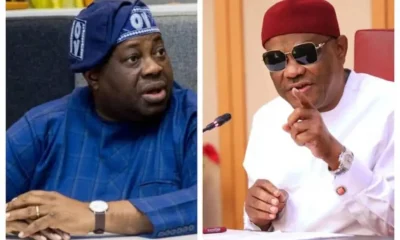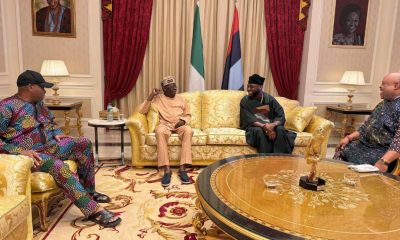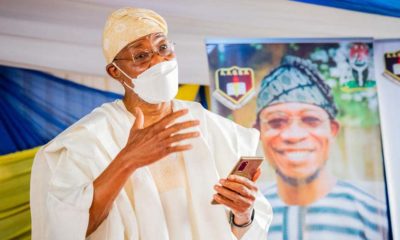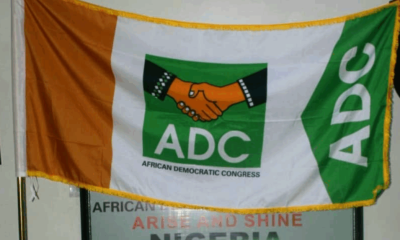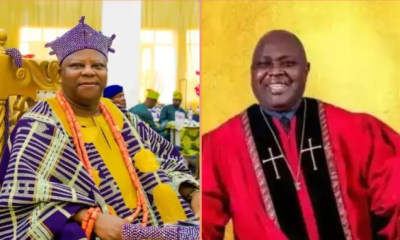News
President Tinubu faces angers as fuel hits N630/litre

There was widespread anger by Nigerians, on Tuesday, following the hike in the pump price of Premium Motor Spirit, popularly called petrol, by the Nigerian National Petroleum Company Limited and other oil marketers across the country.
In Abuja and Ondo State, for instance, the cost of petrol jumped from about N537/litre to between N617 and N630/litre, forcing the cost of transportation to skyrocket within hours, and leaving thousands of passengers stranded in many cities.
The Nigeria Labour Congress, Trade Union Congress and many other citizens lambasted the President Bola Tinubu-led Federal Government for being so tough on citizens by allowing the continued hike in the price of petrol.
Although the NNPCL and the Nigerian Midstream and Downstream Petroleum Regulatory Authority, both Federal Government entities, explained that market forces caused the hike in petrol price, since the commodity had been fully deregulated, Nigerians expressed frustrations over the continued sharp increase in the cost of the product.
It was observed that petrol price was raised from N537/litre to N617/litre at some filling stations operated by the NNPCL in Abuja on Tuesday.
Independent oil marketers confirmed the increase in the cost of the commodity, as they stated that any shift in price by NNPCL stations was an indication of a rise in the pump price of PMS.
“This is because NNPCL is still the major importer of petrol into Nigeria currently, though other marketers are gradually importing the commodity. The price this (Tuesday) morning at some NNPCL stations is N617/litre,” the Secretary, Independent Petroleum Marketers Association of Nigeria, Abuja-Suleja, Mohammed Shuaibu, told one of our correspondents.
Tinubu had during his inaugural address on May 29, announced that subsidy on petrol had ended, a development that led to the jump in the price of the commodity from N198/litre to over N500/litre on May 30, 2023.
Since the withdrawal of subsidy on petrol and the floating of the naira against the dollar, marketers had continued to explain that the cost of PMS could rise to as high as N700/litre.
Similarly, the rise in the cost of crude oil in the international market has also triggered further hike in petrol price, as crude is the product from which PMS and other refined petroleum products are produced.
In Abuja, on Tuesday morning, motorists besieged filling stations that were still dispensing at N540/litre, but as the news of the hike in price by NNPCL stations filtered in, many independent outlets shut their stations.
Others immediately commenced the adjustment of their pumps to reflect the new price.
The Nigeria Labour Congress on threatened to take “matters into its own hands” following the decision by the NNPCL to hike petrol price and the Federal Government’s plan to distribute N8,000 monthly to 12 million poor households in the country.
The NLC in a statement issued by its National President, Joe Ajaero, accused the Tinubu-led government of taking from the poor to pay the rich and unleashing suffering, hardship and sorrow upon Nigerians.
It said it had restrained itself from making further comments publicly on the vexatious issues around the recent but unfortunate unilateral hike in the price of petrol, which was in the guise of “the so-called subsidy withdrawal.”
The statement read in part, “However, the government of Nigeria seems to have been misled into believing that resorting to impunity and imperiousness in governance in a democracy is a beneficial option as it pursues its stated and unstated objectives.
“It is this belief that we are sure has continued shaping the actions of this government since its inauguration on May 29, 2023, to continue inflicting mindless and heartless pains on the populace one after the other without the decency of embracing the tenets of democracy which requires wide and deep stakeholder consultations on weighty matters of state.”
The NLC stated that Nigerians would remember that the Federal Government had called for dialogue in the aftermath of its disastrous forlorn trajectory in the astronomical increase in petroleum product price “and our subsequent call for a nationwide industrial action.”
It said, “We were also witnesses to the actions of the Federal Government in procuring an unholy injunction from the courts which were served us in Gestapo style by trucks laden with fully armed soldiers and policemen.
“In all of these provocations, we remained committed to the principles of the rule of law, good conscience and democracy so that we can continue to be the moral compass for leaders in the public space. This explained our decision to suspend action on the proposed strike.”
The labour union, however, stated that rather than reciprocate the goodwill of Nigerian workers, the Federal Government insisted on threading the path of dictatorship and seeking to impoverish the people further by taking steps that could only be described as robbing the people of Nigeria to pay and feed the rich.It said, “It is on this basis that the NLC strongly condemns the decision of the Tinubu-led administration to seek the approval of the National Assembly to obtain another tranche of external loans worth N500bn from the World Bank for the purposes of carrying out a phantom palliative measure to cushion the effect of its poorly thought-out hike in the price of PMS.
“Remember that the $800m which was already proposed before the devaluation of the naira by this government was worth about N400bn then but is now worth about N650bn after devaluation. It is from this, it proposes to bring out N500bn for distribution.
“The proposal to pay N8,000 to each of the so-called 12 million poorest Nigerian households for a period of six months insults our collective intelligence and makes a mockery of our patience and abiding faith in social dialogue which the government may have alluded to albeit pretentiously.”
The NLC pointed out that the “further proposal to pay National Assembly members the sum of N70bn and the Judiciary N36bn is the most insensitive, reckless and brazen diversion of our collective patrimony into the pockets of public officers whose sworn responsibility it is to protect our nation’s treasury.”
The union said this might amount to hush money and outright bribery of the other arms of government to acquiesce the aberration.
“It is unconscionable that a government that has foisted so much hardship on the people within nearly two months of coming into office will make a proposal that clearly rewards the rich in public office to the detriment of the poor.
“What this means all this while is that the government is seeking ways of robbing the very poor Nigerians so that the rich can become richer. There is no other way to explain the proposal to pay a misery sum of N8,000 to each of the mysterious poorest 12 million households for six months which amounts to N48,000 and pay just 469 national legislators N70bn or about N149m each, while the Judiciary that has about 72 Appeal Court Judges, 33 National Industrial Court Judges, 75 Federal High Court Judges and 21 Supreme Court Judges and a total of about 201 Judges receives a total of N35bn or N174m each.
Punch

News
AMCON lists Silverbird’s Abuja Mall for sale over Murray-Bruce debt
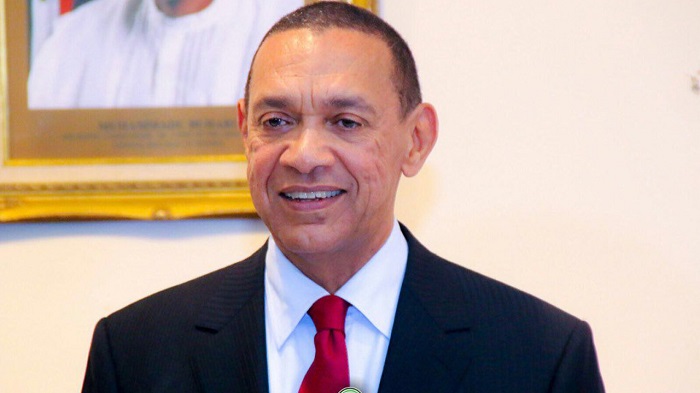
The Asset Management Corporation of Nigeria (AMCON) has listed the Silverbird Entertainment Centre in Abuja for sale to recover a longstanding multi-billion naira debt linked to a former Nigerian Senator, Ben Murray-Bruce, and his companies.
The listing, published in a recent public notice by AMCON, shows that the Abuja Mall, a prime commercial complex located in the Central Area, Cadastral Zone, is now open for bids from interested buyers. The property is among several assets AMCON disposes of across different states, including Lagos, Rivers, Oyo and Plateau.
The Abuja mall, operated under Silverbird Entertainment, was previously seized following a 2016 Federal High Court order over a debt of more than N10 billion owed to AMCON by several companies owned by the Murray-Bruce family. Those affected include Silverbird Productions Limited, Silverbird Showtime Limited and Silverbird Galleria Limited.
In June 2016, the court appointed a receiver, M.A. Banire, to take over the companies’ assets on AMCON’s behalf. Justice C.M.A. Olatoregun, who presided over the matter, also barred Mr Murray-Bruce, his brothers Guy and Roy Murray-Bruce, and other family members from interfering with the receiver’s work. The court’s order covered several mortgaged properties in Abuja, Lagos, and Port Harcourt.
Despite negotiations that followed the initial seizure, the debt remained unresolved. AMCON said the latest sale is part of a broader asset recovery strategy targeting high-profile debtors who have failed to meet their obligations.
Silverbird’s Abuja mall is one of the group’s flagship properties, housing retail shops, a cinema, restaurants and office spaces. According to AMCON’s notice, the property comes with a gross lettable area of 15,050.91 square metres and is being sold as is.
Senator Ben Murray-Bruce, who served in the National Assembly representing Bayelsa East from 2015 to 2019, is also a prominent media entrepreneur and founder of the Silverbird Group, which operates television and radio stations in Nigeria and Ghana, as well as the Most Beautiful Girl in Nigeria (MBGN) beauty pageant.
As of 2017, AMCON said over 400 high-profile obligors were responsible for about N4.5 trillion nearly 80 per cent of the total outstanding debt on its books. The Corporation has since adopted more aggressive recovery efforts, including asset sales and legal enforcement.
Bids for the Abuja mall and other listed properties are due by 11 July.
Prospective buyers are advised to visit AMCON’s official website or contact the designated coordinating agents for details.
Murray-Bruce did not respond to a request for comment on the planned sale as of the time of filing this report.
News
Tinubu, 5 governors arrive Brazil for BRICS meeting

President Bola Ahmed Tinubu has arrived in Rio de Janeiro, Brazil, to participate in the 17th Summit of Heads of State and Government for the Global South and Emerging Economic Bloc, which includes Brazil, Russia, India, China, and South Africa (BRICS).
The President’s flight touched down at the Galeao Air Force Base tarmac at 8:45 pm on Friday, where the Galeao Air Force Base Commander coordinated the Guard of Honour.
Brazil’s Deputy Minister for Africa and the Middle East, Ambassador Carlos Sergio Sobral Duarte, and the Deputy Minister for Trade Promotion, Science, Technology, Innovation, and Culture, received President Tinubu.
President Tinubu is in Brazil at the invitation of President Luiz Inacio Lula Da Silva. The Nigerian leader will attend a bilateral meeting hosted by President Lula today, July 5, ahead of the summit on June 6 and 7.
At the BRICS Summit, the President will participate in a plenary session and deliver an address on Nigeria’s ongoing reforms to reposition the economy for global competitiveness.
According to the Presidency, he will also attract investors to capitalise on the country’s opportunities in agriculture, solid minerals, healthcare, and alternative energy.
The summit’s theme is “Strengthening Global South Cooperation for More Inclusive and Sustainable Governance.” Deliberations will centre on health, Artificial Intelligence, governance, and Climate Change issues.
Ahead of the Leaders’ Summit, the political negotiators of BRICS brainstormed over aligning more commitments to combat socially determined diseases, artificial intelligence governance, and climate finance.
State Governors participating in the summit with the President are Hyacinth Alia (Benue), Prince Dapo Abiodun (Ogun), Babajide Sanwo-Olu (Lagos), Sheriff Oborevwori (Delta) and Mohammed Umar Bago (Niger).
News
APC appoints Ali Bukar Dalori as acting National Chairman
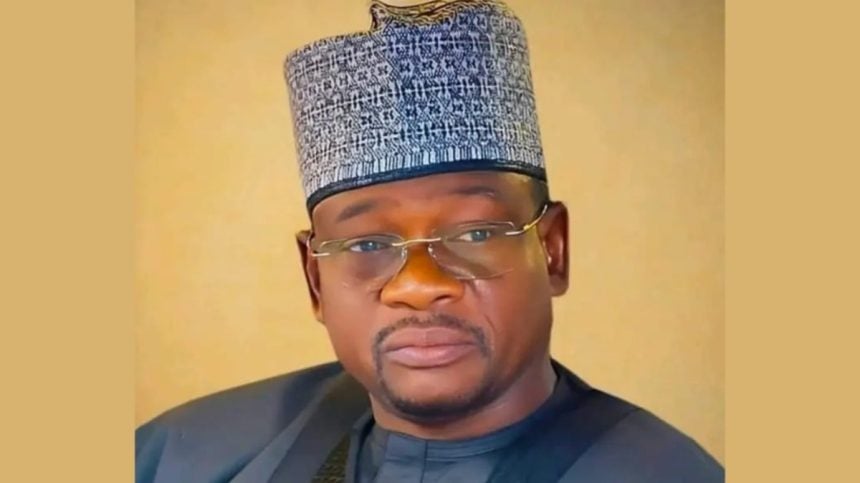
The All Progressives Congress (APC) has appointed Hon. Ali Bukar Dalori as the acting National Chairman of the party following the resignation of Dr. Abdullahi Umar Ganduje.
Dalori, who currently serves as the Deputy National Chairman (North), was directed by President Bola Ahmed Tinubu to assume the leadership role in an acting capacity pending the meeting of the party’s National Executive Committee (NEC), which is being convened immediately to fill the vacancy.
The announcement was contained in an official statement signed by the party’s National Publicity Secretary, Felix Morka, on Friday in Abuja.
According to the statement, Ganduje tendered his resignation with immediate effect in order to attend to “urgent and important personal matters.”
Dalori’s appointment comes nearly two years after Ganduje was appointed National Chairman in August 2023, succeeding Senator Abdullahi Adamu.
During his tenure, Ganduje was praised for promoting party cohesion, driving electoral strength, and overseeing key defections into the party.
With Dalori now at the helm, the APC said it remains “steadfast and unwavering” in delivering President Tinubu’s Renewed Hope Agenda and sustaining internal unity.
The party expressed gratitude to Ganduje for his “invaluable contributions and distinguished record of service” and extended well wishes for his future endeavours.
News
Fresh details as Tinubu signs tax reform bills into law

President Bola Tinubu has signed the four tax reform bills into law. Tinubu assented to the bills at the Presidential Villa on Thursday.
The four proposed laws are the Nigeria tax bill, the Nigeria tax administration bill, the Nigeria revenue service (establishment) bill, and the joint revenue board (establishment) bill.
The signing ceremony was attended by Senate President Godswill Akpabio, Tajudeen Abbas, speaker of the house of representatives, and Julius Ihonvbere, house majority leader.
Also present were Abdulrazaq Abdulrahman, governor of Kwara, Hope Uzodinma, his Imo counterpart, and Wale Edun, minister of finance, among others.
Tinubu transmitted the proposed legislation to the national assembly on October 3, 2024, urging lawmakers to pass the tax reform bills.
The bills initially faced opposition from the northern governors, who argued that the proposed laws could harm the region’s interests, asking the national assembly to reject the bills and demanding fair and equitable implementation across all regions.
However, in January, the Nigeria Governors’ Forum (NGF) endorsed the bills after agreeing on an “equitable” VAT-sharing formula.
The house of representatives passed the bills in March, while the senate approved them in May.
On June 18, the legislature transmitted the bills to the president for assent.
Speaking earlier on Thursday, Tinubu said the tax bills will unify the country’s fragmented tax system.
“They (tax reform bills) deliver the first major, pro-people tax cuts in a generation, targeted relief for low-income earners, small businesses, and families working hard to make ends meet,” Tinubu said.
“For too long, our tax system has been a patchwork—complex, inequitable, and burdensome. It has weighed down the vulnerable and shielded inefficiency. That era ends today.”
Tinubu added that the bills will eliminate wasteful duplications, reduce red tape, restore investor trust, and promote transparency and coordination at all levels.
Crime
Businessman, Pebeto Enerji Limited arraigned by EFCC for $75,000 fraud

A businessman, Peter Otomewu and his company, Pebeto Enerji Limited, were on Monday arraigned by the Economic and Financial Crimes Commission, before the Ikeja Special Offences Court for allegedly defrauding a petroleum services company of $75,000.
The defendants were docked on a two-count charge bordering on obtaining money by false pretence and stealing, preferred against them by the EFCC.
The anti-graft agency’s prosecution counsel, M.S. Owede, told the court that Otomewu and his firm committed the alleged offences sometime in 2018.
Owode told the court that the defendants fraudulently obtained the sum of $75,000 from Virgin Forest Energy Limited under the false pretext that they had a vessel, MT AYSU, capable of transshipping petroleum products from a mother vessel.
The prosecutor alleged that the representation was false and that the money was never used for the stated purpose.
Otomewu and his firm were accused of dishonestly converting the entire $75,000 property of Virgin Forest Energy Limited to their use.
According to the EFCC, the offences committed contravened Sections 278, 278(1), and 411 of the Criminal Law of Lagos State, 2015, and Section 1(1)(a) and 1(3) of the Advance Fee Fraud and Other Related Offences Act, 2006.
However, both defendants who were docked before Justice Mojisola Dada pleaded not guilty to the charges against them when it was read.
Following the not-guilty plea, Owede asked for a trial date and also urged the court to remand the first defendant, Otomewu, in a correctional centre.
But the defence counsel, Mr Peter Ajabor, however, prayed the court to grant bail to the defendants on liberal terms.
Consequently, Justice Dada granted bail to the defendants in the sum of N50m, with two sureties in like sum.
The judge ordered that the sureties must be gainfully employed and reside within the court’s jurisdiction.
She also ordered that the sureties must have N50m in their bank accounts.
Justice Dada further ordered the remand of Otomewu in the correctional centre, pending the perfection of the bail conditions.
The matter was adjourned to September 29, 2025, for commencement of trial.
Crime
EFCC quizzes Abuja businesswoman Halimat Tejuosho over alleged appointment scam

The Economic and Financial Crimes Commission (EFCC) has interrogated an Abuja-based businesswoman, Halimat Tejuosho, over her alleged involvement in an appointment and contract scam.
Tejuosho, said to be the founder of Haleems Integrated Services Limited, was reportedly quizzed after victims accused her of using false pretenses to obtain funds in exchange for promises of federal appointments and lucrative government contracts.
Counsel to one of the victims, Chief Tolu Babaleye, alleged that Tejuosho ran an elaborate scheme involving forged documents and fake appointment letters to deceive unsuspecting individuals.
He claimed she posed as an aide to the National Security Adviser, Mallam Nuhu Ribadu, to lend credibility to her claims.
“The court had earlier recommended her for prosecution on charges bordering on Advance Fee Fraud, Criminal Diversion of Funds, Criminal Breach of Trust, and Cheating,” Babaleye said.
He also alleged that Tejuosho used her involvement in humanitarian and NGO activities as a smokescreen to attract victims and gain their trust.
EFCC Spokesperson, Mr Dele Oyewale, confirmed that she was invited for questioning and has since been granted administrative bail under stringent conditions.
Investigations are ongoing, and the commission says she may be formally charged to court in the coming weeks.
The anti-graft agency also urged other potential victims to come forward, reiterating its resolve to clamp down on all forms of financial crime.

 Sports2 weeks ago
Sports2 weeks agoOfili: ‘Nigeria doesn’t deserve you’ – Fans react as athlete switches allegiance to Turkey

 News2 weeks ago
News2 weeks agoUS Back Out: Angry Trump withdraws support for Israel, issues fresh warning, “Do not drop those bombs”

 Sports2 weeks ago
Sports2 weeks ago‘Don’t sign him, he doesn’t follow instructions’ — Club warned against signing Super Eagles star

 Spotlights2 weeks ago
Spotlights2 weeks agoNo More War: US plots Donald Trump impeachment over unauthorized Iran bombing
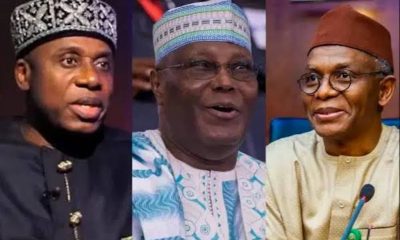
 Spotlights2 weeks ago
Spotlights2 weeks agoAtiku sidelined again as ADA picks Presidential Flagbearer

 Politics1 week ago
Politics1 week agoFresh crisis hits coalition as El-Rufai, Obi may pull out over Atiku’s silence game

 Politics2 weeks ago
Politics2 weeks ago2027: Shettima fights back over plot to drop him as Vice President; crisis hits APC




